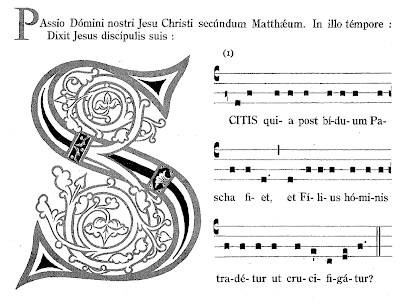Thanks to a very special donor with a far-seeing vision, three fantastic books from the past have been digitized and thereby liberated into the infinite sector of the global commons. Many, many priests who celebrate the extraordinary form will rejoice at this news. These books that cover chants for Holy Week have been nothing short of impossible to obtain. You see them sometimes in choir lofts that miraculously escaped the great gutting of the late 1960s. Now they are back. If you print them, they appear on 8.5×11 sheets. I decided to forgo the color for load speed and convenience.
Cantus Passionis (1952): Volume I, Volume II, Volume III


These are some of my favorite chants of the whole year. The formulas/melodies are so captivating, even if you can't understand the Latin or don't have a translation available (as was the case the first time I heard it). What a gift!
Actually, as I think about it, I see no reason not to use these in the ordinary form, right? The passions would be the same. Am I right?
Jeffrey opined:
> Actually, as I think about it, I see no reason not to use these in the ordinary form, right? The passions would be the same. Am I right?
Actually, no…and yes. The textual citations may be different.
For example, for the Passion Gospel on Palm Sunday this year, the extraordinary form uses Matthew 26:36 thru 27:60; whereas the ordinary form uses Matthew 26:14 through 27:66 (or 27:11-54).
On Good Friday, however, both forms use the same verses from the Passion according to John.
Surely you are aware that the Holy See publishes the notated Passion Gospels for the Ordinary Form? I picked up a copy when I was in Rome several years ago.
Jeffrey, am I right in assuming that these are no longer under copyright?
I sang Christus from this edition in an Ordinary Form liturgy several Good Fridays ago in the Church of Our Lady of Mount Carmel, Chicago, with Paul French conducting the marvelous choir at the west end in the Turba lines and a superbly experienced and accomplished tenor as Evangelista and a brilliant young countertenor as Synagoga. I was way out-talented by the others but managed to do well enough to have a memorable experience (in a good way, for me at least). The church was jammed; the faithful had printed translations in English and Spanish. The tenor in particular breathed his lines effortlessly and smoothly, as though his first language were Latin. Superb!
Were there any changes made to the chants of Holy Week in the 1951/1955 Holy Week reforms? If so, do these books present the pre-Pian or post-Pian Holy Week?
Editiones typicae pro celebratione Missae
Passio Domini Nostri Iesu Christi Liber cantus
Editio typica (1989)
http://www.paxbook.com/algorithmiS/servusPrimus?iussum=monstraScriptumEditum&numerus=20703
Let's try that URL one more time:
Editiones typicae pro celebratione Missae
Passio Domini Nostri Iesu Christi Liber cantus
Editio typica (1989)
http://tinyurl.com/4z8omco
Sadly, these Passion Books match neither the 1962 or the Novus Ordo Missals.
The texts were shortened/altered in the Holy Week reforms of the 1950's (See here.)
The text of the Novus Ordo Passion is from the Nova Vulgata Bibliorum Sacrorum editio. There's a good article from Notitae, via Sacred Music, via EWTN on the new passion chants.
The text of the Novus Ordo Passion is from the Nova Vulgata Bibliorum Sacrorum editio.
Which is to say, they match the Novus Ordo texts even less than the 1962 texts.
The "Planctus" is gone after 1955 as that text was done away with- the most musically GLORIOUS part of the whole Passion. However, we do the complete Passion with Planctus at St Stephen's in Sacramento, and so does everyone else I know. Lucky for us that good taste wins the day and not Bugnini's mis-guided Holy Week reform. (J. Morse)
Anyone know the reason for the suppression of the Planctus tone at the end?
Robert- The reason the planctus is gone is because the text was cut.
(J.Morse)
This comment has been removed by a blog administrator.